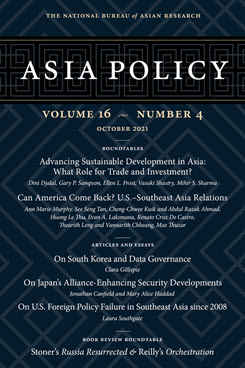FDI in the ASEAN States
The Engine that Roared
This essay examines how Southeast Asia’s economic fortunes are at risk as the climate for trade and investment sours.
This roundtable was made possible by the generous support of the Hinrich Foundation.
EXECUTIVE SUMMARY
MAIN ARGUMENT
FDI is the engine that has propelled economic growth in Southeast Asia over the last few decades. The region, grouped together as ASEAN, has astutely used foreign investment and know-how to upgrade technology and skills and to transition from a low-cost manufacturing model to high-value goods and services. This openness to trade and investment has transformed the region’s economic fortunes, with front-runners such as Singapore, Vietnam, Malaysia, Cambodia, and Thailand at the vanguard of global manufacturing in fields as diverse as electronics, automobiles, pharmaceuticals, and textiles. ASEAN’s success as a manufacturing hub would not have been possible without both an openness to trade and the presence of regional supply chains that favorably position Southeast Asia as an essential supplier of raw materials and key components for final assembly in China. But this defining economic model is confronting headwinds that could upend its continued success. The region’s policymakers face a difficult set of challenges as they navigate an increasingly disruptive external and internal landscape.
POLICY IMPLICATIONS
- ASEAN is at the epicenter of growing trade and geopolitical tensions between the U.S. and China, which raises the threat of decoupling and supply chain reconfiguration and potentially places the region in a difficult position of having to take sides.
- Deglobalization and reshoring also pose a risk to manufacturing and investment, which ASEAN states depend on. Protectionist policies are resurging in Europe and the U.S., and the Covid-19 pandemic highlights the fragility of just-in-time supply chain management, encouraging instead a just-in-case approach. This will test the region’s ability to sustain its high pace of economic growth to meet rising public aspirations and concerns about stalling social mobility.
- Southeast Asia is already facing climate-related devastation due to rising ground temperatures and sea levels. The region is challenged to adjust its economic model to build a more sustainable future.
Vasuki Shastry is an Associate Fellow in the Asia-Pacific Programme at Chatham House (United Kingdom), where his research interests are Asian economic and financial integration and the interplay between technology and democracy. He has previously worked in the public and private sectors, including for the International Monetary Fund, the Monetary Authority of Singapore, and Standard Chartered Bank. His most recent book is Has Asia Lost It? Dynamic Past, Turbulent Future (2021).
About Asia Policy
Asia Policy is a peer-reviewed scholarly journal presenting policy-relevant academic research on the Asia-Pacific that draws clear and concise conclusions useful to today’s policymakers. Asia Policy is published quarterly in January, April, July, and October and accepts submissions on a rolling basis. Learn more


